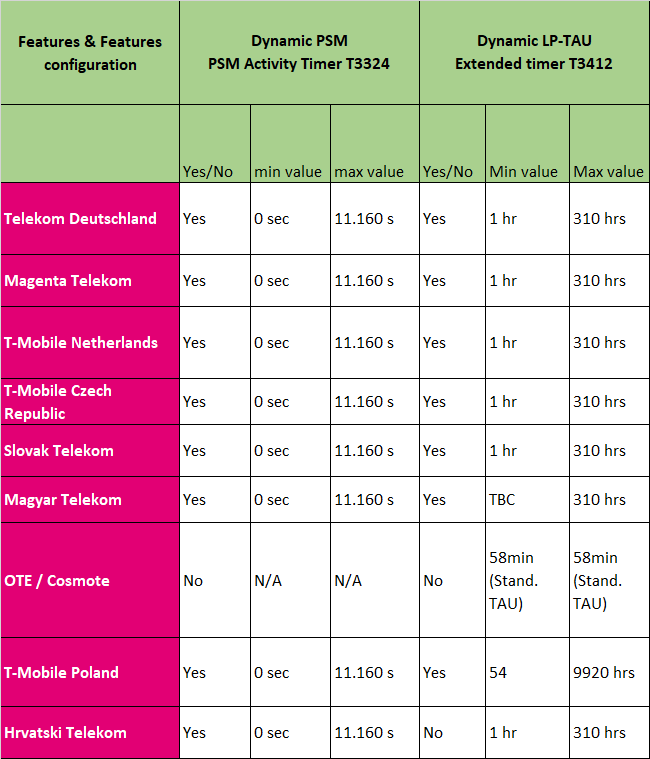PSM NB-IoT Timer
-
Customer:
Are there any restrictions or a minimum timer value on the part of the Telekom network with regard to the time intervals (PSM NB-IoT T3412 and T3324 Timer)? In our application we need a T3412 value of 10 minutes and a T3324 value of 30 seconds. We implement this in our module (Quectel BG77, FW version BG77LAR02A04_01.001.01.001) with the following AT cmd: AT + QPSMS = 1, “00000001“, “00001111“.
On the module side, the command is confirmed with “OK”. About AT + QPSMS? we then ask about the network configuration. As feedback we get: + QPSMS: 1, “7200”, “30”. Here, however, we would expect + QPSMS: 1, “600”, “30”.Over the weekend we ran a script that repeatedly updates the timers and overwrites them with our configuration. This happens both before you dial into the network and after you have successfully logged in.
However, the network response remains unchanged at: + QPSMS: 1, “7200”, “30”.
It is interesting that if you set PSM times greater than 2 hours - these are confirmed by the network; Times less than 2 hours are set to 2 hours.Support:
The PSM time must not be shorter than 60 minutes; surprisingly, this timer cannot currently be less than 2 hours. I have just contacted the NT colleagues so that they can check the configuration. In any case, a timer of 10 minutes is not possible (would cause too many TAU messages).Customer:
Thanks - can you look in the specification to which values the 2 timers can or should be adjustable?
Kunde:
Gibt es bezüglich der Zeitintervalle (PSM NB-IoT T3412 und T3324 Timer) seitens des Telekom Netzwerks Restriktionen bzw. einen minimalen Timer-Wert? In unserer Anwendung benötigen wir einen T3412 Wert von 10 Minuten und einen T3324 Wert von 30 Sekunden. Dies setzen wir in unserem Modul (Quectel BG77, FW Version BG77LAR02A04_01.001.01.001) mit folgendem AT cmd um: AT+QPSMS=1,“00000001“,“00001111“.
Modulseitig wir der Befehl via „OK“ bestätigt. Über AT+QPSMS? fragen wir im Anschluss die netzwerkseitige Konfiguration ab. Als Feedback bekommen wir: +QPSMS: 1,“7200”,“30”. Hier würden wir jedoch +QPSMS: 1,“600”,“30” erwarten.Über das Wochenende haben wir ein Skript laufen lassen, das die Timer wiederholt aktualisiert und mit unserer Konfiguration überschreibt. Dies geschieht sowohl vor der Einwahl ins Netz, als auch nach dem erfolgreichen Einbuchen.
Die Antwort des Netzwerks bleibt jedoch unverändert bei: +QPSMS: 1,“7200”,“30”.
Interessant ist, dass wenn man PSM Zeiten größer 2 h einstellt - diese vom Netz bestätigt werden; Zeiten kleiner 2 Stunden werden auf 2 h gesetzt.Support:
Die PSM Zeit darf nicht kürzer als 60 Min sein, erstaunlicherweise kann dieser Timer sogar derzeit nicht unter 2 Stunden sein. Ich habe gerade die NT-Kollegen kontaktiert, damit sie die Konfiguration nachprüfen. Auf alle Fälle ist ein Timer von 10 Minuten nicht möglich (würde zu viele TAU-Nachrichten verursachen).Kunde:
Danke - kann man in der Spezifikation nachsehen, auf welche Werte die 2 Timer einstellbar sind bzw sein sollen? -
Dear customer,
In the table below, you will find the latest configuration of the PSM timers (Activity timer T3324 and Extended TAU timer T3412) in the DT NB-IoT networks.
Note: all parameters provided below are subjected to change and are therefore only indicative and provided without guarantee. This table shall be seen as a snapshot of DT’s network configuration and values may evolve over time.As mentioned above, we are currently checking the minimum value for the T3412 timer (reported by users as being set to 2 hours) and will confirm this value asap.

-
@Ronan-Lacroix I have a question: The min value for T3412 is only valid for the “extended” version of TAU ? Does the 1 hour apply also to the min. value of standard TAU or is it shorter?
Having a min TAU of 1 hour seems to me for many use cases difficult because the devices in those use cases need to wakeup from sleeping much more often (e.g. every 10 minutes).Many many thanks for your support!
Regards, Roland
I